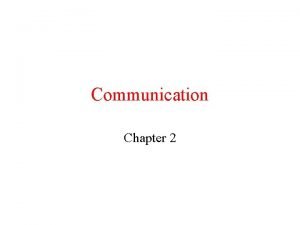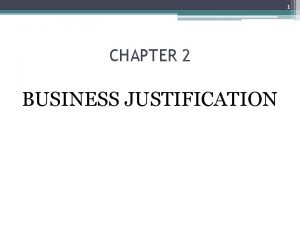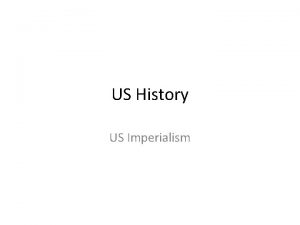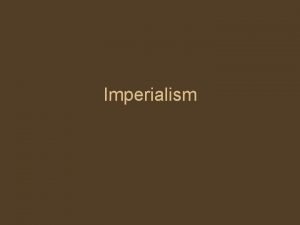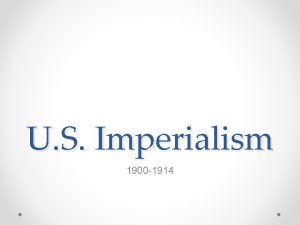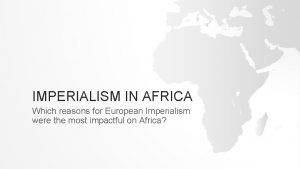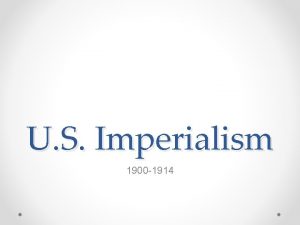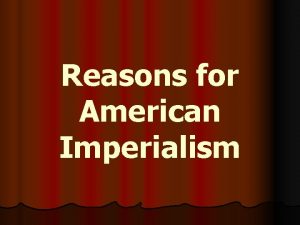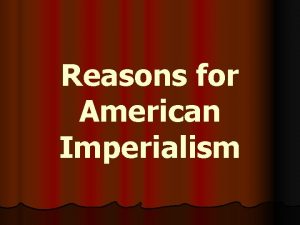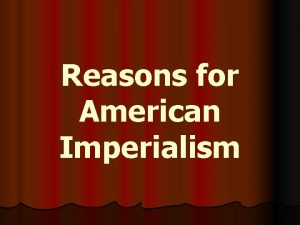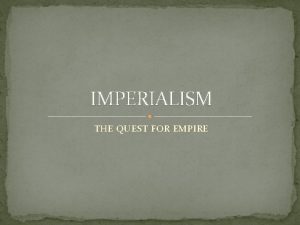Discussion What is imperialism U S Imperialism Reasons














- Slides: 14

Discussion: What is imperialism? U. S. Imperialism

Reasons for U. S. Expansion Economic Depression of 1893 Need for markets

“We are raising more than we can consume…We are making more than we can use. Therefore, we must find new markets for our produce, we must find new occupation for our capital, new work for our labor. ” -Senator Albert J. Beveridge (1899)

Reasons for U. S. Expansion Social Frederick Jackson Turner & the Frontier Thesis John Fiske & Manifest Destiny Josiah Strong & Social Darwinism Rudyard Kipling & the “White Man’s Burden”

“The work the English race began when it colonized North America is destined to on until every land on the earth’s surface that is not already the seat of an old civilization shall become English in its language, in its religion, in its political habits and traditions, and to a predominant extent in the blood of its people. ” - John Fiske

Reasons for U. S. Expansion Political European Imperialism Alfred Thayer Mahan & U. S. Naval dominance Monroe Doctrine, 1823

Hawaii �American missionaries �Sugar plantations �Queen Lili’uokalani �Stanford Dole

Cuba �Jose Marti and Cuban nationalists fight for independence �Sinking of the battleship Maine, 1898 �Cuba, Puerto Rico, Guam, and the Philippines �Platt Amendment, 1901 Teddy Roosevelt & the Rough Riders

Philippines �Filipino nationalists and U. S. forces unite to defeat imperialist Spain �Treaty of Paris, 1898 �Emilio Aguinaldo & the Filipino fight for independence � 1902, end of war in the Philippines �Foothold in Asia

Philippines “to educate the Filipinos and to uplift and civilize and Christianize them, and by God’s grace do the very best we could by them. ” - President Mc. Kinley

U. S. Empire, 1900

China ● “Spheres of influence” ● Secretary of State John Hay & the Open Door ●Boxer Rebellion

Anti-Imperialism �Anti-Imperialist League, 1898 �Membership was varied �Believed in the right of all people to independence and self-government

U. S. Imperialism �Key Terms: Social Darwinism, “White Man’s Burden”, Alfred Thayer Mahan, Queen Liliuoakalani, Platt Amendment, Emilio Aguinaldo, Boxer Rebellion, Open Door
 Old imperialism vs. new imperialism
Old imperialism vs. new imperialism New imperialism motives
New imperialism motives Simple distillation
Simple distillation Describe your favourite tv show
Describe your favourite tv show Velocitation means
Velocitation means Poultry judging reasons
Poultry judging reasons Adjacent vs perpendicular
Adjacent vs perpendicular Unit 2 homework 6 algebraic proof
Unit 2 homework 6 algebraic proof To safely transport cargo use
To safely transport cargo use Reasons for expansion
Reasons for expansion Reasons of vitiligo
Reasons of vitiligo Reasons for using layered protocols
Reasons for using layered protocols Habitat loss reasons
Habitat loss reasons Identify and describe
Identify and describe Refers to the reasons, or justification, for a proposal
Refers to the reasons, or justification, for a proposal











